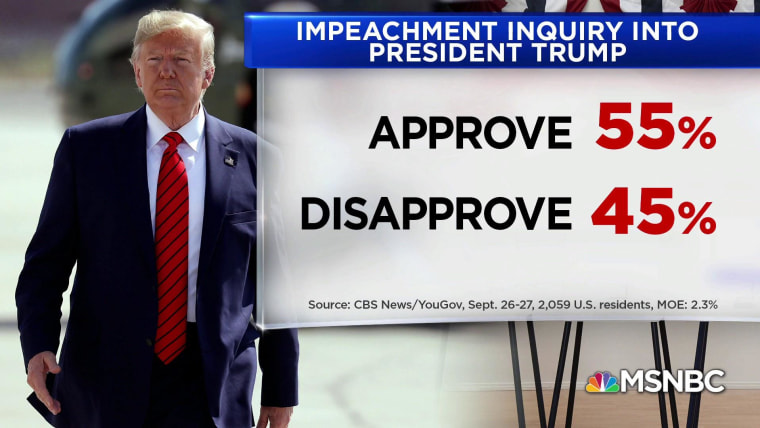WASHINGTON — Top White House aides plan to present President Donald Trump with a wide-ranging response strategy to the growing threat of impeachment in the coming days, following a week of mixed messaging and growing anxiety within Trump’s circle of advisers.
Acting White House chief of staff Mick Mulvaney and White House counsel Pat Cipollone will be among those who present the president with the plan for a rapid-response effort that could come as early as Monday, according to two people familiar with the matter.
Within the White House there has been a growing acknowledgement that a coordinated legal, political, and public relations messaging response is needed to help Trump as it becomes clear he is facing what may be the greatest threat to his presidency so far.
Trump himself declared “we are at war” during a closed-door speech to diplomats at the United Nations, with some aides describing the response effort as a war room fashioned after the Clinton White House’s response. But others are trying to downplay the seriousness of the threat, side-stepping the war room terminology.
"I just went through a war. This is a skirmish,” said Trump lawyer Jay Sekulow, who helped guide Trump through the Mueller investigation.
Download the NBC News app for breaking news and politics
The White House had not yet responded to a request for comment Sunday afternoon.
It was unclear who would lead the internal effort, but one person expected to play a role was White House spokesman Steven Groves, who has spent time in both the White House counsel’s office helping manage the Mueller inquiry and the press shop as a spokesman on issues related to congressional investigations, the sources familiar with the matter said.
Advisers have modeled their response after lessons learned from the Clinton White House’s impeachment fight as well as their own response to the controversy over Justice Brett Kavanaugh’s Supreme Court nomination, which was widely viewed internally as a success, those sources said.
“We’re not going to get caught flat-footed, and we're not going to take it lying down,” said one source.
In the days after House Speaker Nancy Pelosi formally launched an impeachment inquiry following revelations that Trump solicited help from the president of Ukraine to investigate his political rivals, there has been widespread anxiety in the White House, with people familiar with the situation describing the mood as “shell-shocked.”
The White House is planning to rely heavily on outside allies in Congress and with the campaign. Some advisers have mused about bringing back some of Trump’s former aides who have been in the trenches with him before, such as former White House strategist Steven Bannon or campaign manager Corey Lewandowski.
The president’s campaign feels well-equipped to respond to an impeachment threat, after two years of counter-punching on the Russia investigation and former special counsel Robert Mueller’s report.
On Friday, the president’s re-election team previewed a potential strategy: the @realDonaldTrump Twitter account blasted out a new video slamming former Vice President Joe Biden on Ukraine. Less than an hour later, the campaign rolled out a press release announcing a $10 million ad buy on cable and digital for the 30-second spot.
Senior campaign officials indicated the organization’s rapid-response team will continue to produce and roll out impeachment inquiry material on every platform, with a special focus on social media and fundraising messaging.
“Our war room has been fighting back on everything in real time,” said Trump campaign communications director Tim Murtaugh.
Last week, in the 24 hours surrounding the announcement of the impeachment inquiry, the Trump campaign raked in $5 million from its targeted impeachment appeals.
Aides point out that much of the language in Trump’s 2020 solicitation emails often foreshadows White House talking points on impeachment, another sign that the campaign’s fully staffed apparatus is often better prepared to blast out political messaging.
Trump also has help from the Republican National Committee, which has sent blast emails to reporters attacking Democrats and responding in real time to the latest allegations, and said it had posted more than three dozen video clips on social media and made 150 impeachment-related bookings on TV and radio nationally and in target states.
A key part of the messaging is already taking shape. Trump’s allies have sought to paint the Democrats as focused solely on impeachment at the cost of domestic policy issues like gun control and health care, an issue that helped Democrats pick up ground in 2018. Trump will make a health care speech Thursday attacking Democratic plans.
But there was little chance any progress was going to be made on those issues even before the renewed impeachment push by House Democrats, who have already passed measures of their own on guns and health care.
Full coverage: Trump impeachment inquiry
Just months after the special counsel’s investigation slid out of focus, Sekulow, a religious liberties attorney, was back defending Trump in the latest controversy.
“I know how to read a situation and to deal with facts as they develop,” Sekulow said told NBC News, adding, “I'm going to meet the challenge from the outside as appropriate."







